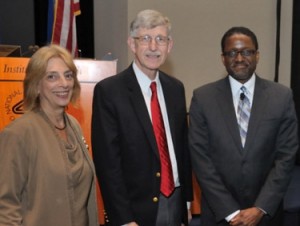April 5th, 2012
NIH Appoints Gary Gibbons As Next Director of the NHLBI
Larry Husten, PHD

NHLBI Acting Director Dr. Susan Shurin, NIH Director Dr. Francis Collins, and the selected new NHLBI director, Dr. Gary Gibbons
Gary Gibbons will be the next Director of the National Heart, Lung, and Blood Institute (NHLBI). The selection of Gibbons was announced today by the National Institutes of Health Director Francis Collins. Gibbons is the founder and current director of the Cardiovascular Research Institute, chairperson of the Department of Physiology, and professor of physiology and medicine at the Morehouse School of Medicine in Atlanta. Susan Shurin, who has been serving as the acting director of NHLBI, will return to her position as the NHLBI’s deputy director when Gibbons assumes his position this summer.
“It’s an honor to join the NIH and lead the Heart, Lung, and Blood Institute,” said Gibbons, in an NHLBI press release. “The globally recognized research and training supported by the NHLBI continues to advance biomedical knowledge in fields related to heart, lung, and blood diseases. I look forward to working with the institute staff and with the many researchers supported by the Institute to foster multidisciplinary approaches to improve disease prevention, diagnosis, and treatment that will advance the health of all Americans.”
Gibbons was an undergraduate at Princeton University and graduated magna cum laude from Harvard Medical School. He completed his residency and cardiology fellowship at Brigham and Women’s Hospital. Before going to Morehouse in 1999, he served on the faculty at Stanford University and Harvard Medical School.
Here is the description of Gibbons research program on his Morehouse webpage:
One of the long-term goals of Dr. Gibbons’ research program is to utilize new genomic technologies to integrate the areas of physiologic genomics, functional genomics and human molecular genetics in the field of vascular biology and medicine. Dr. Gibbons’ translational research laboratory has a longstanding interest in elucidating the molecular mechanisms involved in vascular remodeling in health and disease. His laboratory is interested in discovering novel mediators of vascular disease that may constitute candidate disease susceptibility variants. His program is actively involved in collaborative projects designed to study the functional significance of epigenetic and genomic variation and the potential role of genetic variation in promoting the susceptibility to cardiovascular disease in both clinical and community-based settings. One of the ultimate goals of his program is to take a multi-level, multi-disciplinary approach to understanding and ameliorating racial/ethnic disparities in cardiovascular health.
